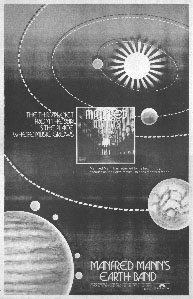![]()
  |

Manfred Mann's Earth Band
Polydor PD-5015
Released: February 1972
Chart Peak: #138
Weeks Charted: 6
The latest Mann incarnation is supposed to be a return to pop music which was very kind to Manfred Mann (and vice versa) in terms of hit records and overall success in the middle and late 'sixties. The basic problem with this album is a lack of direction which makes listening to the entire record somewhat disconcerting. Not that there's anything wrong with a bit of variety, it being the spice of life and all that, but there is a lot of pretentious filler on this album that obscures good pop songs which are only four in number. Randy Newman's "Living Without You" is a good choice for this group and they do it well; Bob Dylan's "Please Mrs. Henry" is also fine and it really should have been a single hit in this country in the Mann-Dylan tradition of "Quinn The Eskimo" and "If You Gotta Go, Go Now." Two new Mann tunes, "Part Time Man" and "I'm Up And I'm Leaving You" are likewise commendable and both have a kind of simple endearing quality about them. The other material is simply not compatible with these numbers. There's some heavy instrumental work that's tedious at best.
 Click image for larger view. |
- Bob Moore Merlis, Words & Music, 6/72.
Bonus Review!
Mann has always embraced rock and roll's art-commerce dichotomy with uncommon passion -- he used to rave on about jazz to the fanmags in the "Doo Wah Diddy Diddy" days. This extraordinary cult record achieves the synthesis. Almost every song is defined by a hook that repeats over and over -- the phrase "down on my knees" in "Please Mrs. Henry," the galvanizing guitar riff that runs through the almost-hit "Living Without You." But the doo-wah-diddy is continually threatened by an undercurrent of jazzy disintegration -- the Cecil Taylor piano jangles that colse "Jump Sturdy" or the discords that dominate the closing instrumental. The deliberately characterless vocal ensembles and square rhythms defy today's pseudo-soul norm, and Mann's songs -- especially the brilliant "Part Time Man," about not getting a job after World War III -- are indecisive and a little down. In short, the perfect corrective to the willful brightness of boogie optimism. A+
- Robert Christgau, Christgau's Record Guide, 1981.
![]() Reader's Comments
Reader's Comments
No comments so far, be the first to comment.
